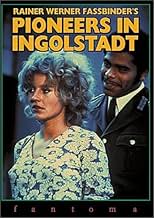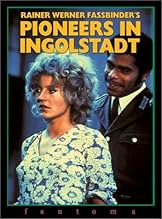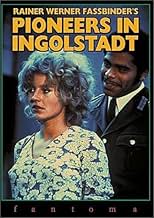AVALIAÇÃO DA IMDb
6,3/10
648
SUA AVALIAÇÃO
Adicionar um enredo no seu idiomaBerta, a naive young maid, searches for love when the army engineers come to town to build a bridge.Berta, a naive young maid, searches for love when the army engineers come to town to build a bridge.Berta, a naive young maid, searches for love when the army engineers come to town to build a bridge.
- Direção
- Roteiristas
- Artistas
- Direção
- Roteiristas
- Elenco e equipe completos
- Produção, bilheteria e muito mais no IMDbPro
Avaliações em destaque
If there's one thing that really bothers me about Fassbinder's history is how boggled his film chronology is. For someone who improved at such a consistent rate, it's really annoying in the case of his first 11 "anti-theater" films, that no one seems to know what order they came in.
According to the information on the recent DVD issue of this movie, "Pioneers" is the last of those first 11. Now, I could have sworn that "Beware of a Holy Whore" was Fassbinder's 11th film (which would make more sense, given that movie's self-reflexive 'biting the hand that feeds you' nature). Alas, maybe this one is number 11.
On a technical level, this is very much "early Fassbinder", which is best evidenced by Dietrich Lohmann's early cinematography. When working with Michael Ballhaus, Fassbinder was able to have his camera swoop around his characters. Even if they still weren't doing anything, it at least gave some external feel to the movie. Dietrich Lohmann is the polar opposite. He just points the camera, and occasionally pans it, as in one seen that pans back and forth between two characters talking for about 5 minutes. Fassbinder always loved long takes, and always liked giving a theatrical look to his movies, especially the early ones. Michael Ballhaus was able to nail this, but Lohmann's camera work always seemed a bit amateur. It worked great in "Effi Briest", and certain scenes of "Merchant of Four Seasons" and "American Soldier", but I can see why Michael Ballhaus slowly became Fassbinder's preferred camera man going into the mid-'70s.
That said, this movie is also indicative of Fassbinder's early career in that is stars seedy low lives. Before, he usually used gangsters, here he uses whores and bored, drunken soldiers (or 'pioneers'). They sit and drink and do typical Fassbinder stuff (occasionally have sex, occasionally beat someone up). There's some plot here and there. It definitely gives you what you're looking for when renting a Fassbinder movie, but certain scenes had a Fassbinder-by-numbers quality. In one of the final scenes, Hanna Schylla starts chasing after the morally bankrupt guy she's fallen in love with. I said under my breath "she's going to trip and fall and start to cry". I was right. Maybe I've seen too many Fassbinder movies, or maybe Fassbinder was treading a bit too much water with this one.
Like I said, this movie does the trick if you're looking for a Fassbinder fix, and in that, I have to commend it. It's just a movie best reserved for the devoted fans.
According to the information on the recent DVD issue of this movie, "Pioneers" is the last of those first 11. Now, I could have sworn that "Beware of a Holy Whore" was Fassbinder's 11th film (which would make more sense, given that movie's self-reflexive 'biting the hand that feeds you' nature). Alas, maybe this one is number 11.
On a technical level, this is very much "early Fassbinder", which is best evidenced by Dietrich Lohmann's early cinematography. When working with Michael Ballhaus, Fassbinder was able to have his camera swoop around his characters. Even if they still weren't doing anything, it at least gave some external feel to the movie. Dietrich Lohmann is the polar opposite. He just points the camera, and occasionally pans it, as in one seen that pans back and forth between two characters talking for about 5 minutes. Fassbinder always loved long takes, and always liked giving a theatrical look to his movies, especially the early ones. Michael Ballhaus was able to nail this, but Lohmann's camera work always seemed a bit amateur. It worked great in "Effi Briest", and certain scenes of "Merchant of Four Seasons" and "American Soldier", but I can see why Michael Ballhaus slowly became Fassbinder's preferred camera man going into the mid-'70s.
That said, this movie is also indicative of Fassbinder's early career in that is stars seedy low lives. Before, he usually used gangsters, here he uses whores and bored, drunken soldiers (or 'pioneers'). They sit and drink and do typical Fassbinder stuff (occasionally have sex, occasionally beat someone up). There's some plot here and there. It definitely gives you what you're looking for when renting a Fassbinder movie, but certain scenes had a Fassbinder-by-numbers quality. In one of the final scenes, Hanna Schylla starts chasing after the morally bankrupt guy she's fallen in love with. I said under my breath "she's going to trip and fall and start to cry". I was right. Maybe I've seen too many Fassbinder movies, or maybe Fassbinder was treading a bit too much water with this one.
Like I said, this movie does the trick if you're looking for a Fassbinder fix, and in that, I have to commend it. It's just a movie best reserved for the devoted fans.
I have never understood the mystique surrounding Rainer Werner Fassbinder. This writer/director is adored by many, though after seeing at least a dozen of his films, I've found them to be extremely uneven--and sometimes very bad. Some, like "Mother Küsters Goes to Heaven" and "Ali: Fear Eats the Soul" are extremely compelling despite their incredibly low budgets, but others are just dull, bloated and self-indulgent and the average viewer wouldn't even bother with them. The best examples are "Querelle" and "The Bitter Tears of Petra von Kant"--films that film snobs sometimes embrace and insist the public just 'doesn't get it'. All I know is that most of his film just look cheap and I can't think of a single film maker whose films vary in quality like his.
"Pioneers in Ingolstadt" looks like a film made by an amateur film maker and his friends--and that just might be what this is. Any attempt to present a believable story is apparently irrelevant and the costumes looked as if they were just whatever Fassbinder could scrounge. So, while the film is apparently set around 1971 (judging by hair styles, mini skirts, and the look of the town), the soldiers wear ill-fitting, wrinkled and, in some cases, Nazi uniforms!!! Now if it's set in the Nazi era, it's even stranger as one of the soldiers is a black man!! All I know is that some of the soldier's hats have swastikas on them!!! It's as if the film makers just didn't care. And why should Fassbinder get a pass on this because he made 'art films'?! If Spielberg or John Ford were this sloppy, no one would forgive this.
As for the story, it manages to both be vulgar and incredibly dull. It's basically about a bunch of slutty women who want sex from the local soldiers. Alma is the most overtly slutty and likes to get paid for her services and the other women resent her--though they actually are jealous of her slutty ways. As for the men, they are all horny and have even less depth than the women. My guess is that this was a way for writer/director Fassbinder to somehow deconstruct the heterosexual life. This is the only interesting thing about the film--but not enough to make it worth seeing. Who knows, all I know is that the film was dull, terribly made, had some horrible camera work (see the scene at the 22 minute mark and you'll see what I mean). While not as obvious because the story is so awful, the acting is pretty much the quality of community theatre--emotionless, sloppy and not the least bit convincing. Not as bad as some of the Ed Wood films, but not much better. And, not that much better than some of the amateur films posted on YouTube.
"Pioneers in Ingolstadt" looks like a film made by an amateur film maker and his friends--and that just might be what this is. Any attempt to present a believable story is apparently irrelevant and the costumes looked as if they were just whatever Fassbinder could scrounge. So, while the film is apparently set around 1971 (judging by hair styles, mini skirts, and the look of the town), the soldiers wear ill-fitting, wrinkled and, in some cases, Nazi uniforms!!! Now if it's set in the Nazi era, it's even stranger as one of the soldiers is a black man!! All I know is that some of the soldier's hats have swastikas on them!!! It's as if the film makers just didn't care. And why should Fassbinder get a pass on this because he made 'art films'?! If Spielberg or John Ford were this sloppy, no one would forgive this.
As for the story, it manages to both be vulgar and incredibly dull. It's basically about a bunch of slutty women who want sex from the local soldiers. Alma is the most overtly slutty and likes to get paid for her services and the other women resent her--though they actually are jealous of her slutty ways. As for the men, they are all horny and have even less depth than the women. My guess is that this was a way for writer/director Fassbinder to somehow deconstruct the heterosexual life. This is the only interesting thing about the film--but not enough to make it worth seeing. Who knows, all I know is that the film was dull, terribly made, had some horrible camera work (see the scene at the 22 minute mark and you'll see what I mean). While not as obvious because the story is so awful, the acting is pretty much the quality of community theatre--emotionless, sloppy and not the least bit convincing. Not as bad as some of the Ed Wood films, but not much better. And, not that much better than some of the amateur films posted on YouTube.
10hasosch
I cannot deny when many people think that "Pioniere Von Ingolstadt" (1971) was more of less an apprentice piece for Fassbinder, although he had already done a couple of feature films before. I have also no major arguments against those who criticize that both film and play (by Marielouise Fleisser) are basically content-less (why Brecht seriously recommended to perform it "not as whole, but in its parts"): "Pioneers" come into a small Southern German town, the girls, oppressed by the Bavarian patriarchs, are eager to escape with the next-best soldier who comes across them. However, they are disappointed, because they experience sex where they expect love. And the pioneers build a bridge -a really strange metaphor. Is this bridge, that probably never get finished, a connection between the oppressors and the oppressed, the rich (patriarchs) and the poor (servants, the two female lead-characters Alma and Berta or A and B)? The movie raises more question than it gives an answer why Fassbinder did it. Considering that social problems, especially such involved with women, will become central in Fassbinder's later work, we may speculate that here, he laid out all the topics to which he would come back in his following films.
Pioneers of Ingolstadt is one of the early works of the inspired, prolific dramatic director RW Fassbinder, and it may be a very good minor work but minor all the same. It's about a group of soldiers who have been brought to the small town of Ingolstadt to build a bridge. Not much drama happens there as that goes as planned; the meat of the film is the interactions with the local women (i.e. Hanna Schygulla, Irm Herrmann who one might recall from The Merchant of Four Seasons), and how they have some varied personalities (Schygulla wants true love, Herrmann likes to fool around, another girl has... her own thoughts), while the men are, perhaps by design, practically all the same.
It speaks to how much I like Hannah Schygulla and some of Fassbinders other early/consistent players that this was not only watchable but okay, though at the same time it left me wanting more from the characters and from some of the filmmaking itself. As I have worked through Fassbinder's early filmography (as in before Whity and Beware of a Holy Whore and his breakthrough year 1972), I have found it somewhat hit and miss. Even more then his other work, this has such a detached feeling about it, how everyone is disillusioned but also holding back their emotions (in the Bressonian influence I'm sure), and I felt something I don't like when I'm watching a Fassbinder film: boredom.
Its like, we get it, these soldiers toiling at this small town bridge and the local girls who have nothing much else better to do than spend their time with these "pioneers" as they're ironically called, are at best aimless and at worst miserable and cruel and (in their way perhaps) more or less deserve each ether. But this point is driven by Fassbinder, adapting a play he didn't write for German TV, to the point where I didn't care that much for anyone. If it weren't for the natural screen presence of (most of) the actors it might be one or Rainer's lessor films - or, to put it another way, he's explored many of the same themes in other, stronger, more memorable works, or at least with more memorable characters.
And who knows, maybe it wasn't the best idea for me to check this out at the end of a very long work day on 5 hours of sleep. It also doesn't help that the cameraman here has some strange inspirational ideas like... Having a cheap one-light on a camera pointed at actors walking and talking in a dark street. But that's just one example.
It speaks to how much I like Hannah Schygulla and some of Fassbinders other early/consistent players that this was not only watchable but okay, though at the same time it left me wanting more from the characters and from some of the filmmaking itself. As I have worked through Fassbinder's early filmography (as in before Whity and Beware of a Holy Whore and his breakthrough year 1972), I have found it somewhat hit and miss. Even more then his other work, this has such a detached feeling about it, how everyone is disillusioned but also holding back their emotions (in the Bressonian influence I'm sure), and I felt something I don't like when I'm watching a Fassbinder film: boredom.
Its like, we get it, these soldiers toiling at this small town bridge and the local girls who have nothing much else better to do than spend their time with these "pioneers" as they're ironically called, are at best aimless and at worst miserable and cruel and (in their way perhaps) more or less deserve each ether. But this point is driven by Fassbinder, adapting a play he didn't write for German TV, to the point where I didn't care that much for anyone. If it weren't for the natural screen presence of (most of) the actors it might be one or Rainer's lessor films - or, to put it another way, he's explored many of the same themes in other, stronger, more memorable works, or at least with more memorable characters.
And who knows, maybe it wasn't the best idea for me to check this out at the end of a very long work day on 5 hours of sleep. It also doesn't help that the cameraman here has some strange inspirational ideas like... Having a cheap one-light on a camera pointed at actors walking and talking in a dark street. But that's just one example.
I really enjoy Fassbinder pictures, they have a sex thematic, exploiting this vast field not yet properly expanded, he makes an early sketch about to came, in a small city soldiers coming to build a rustic wooden bridge, then women's town interact with these soldiers hoping getting marry or something, however Alma (Irm Hermann) a beauty girl who just wants make sex by money, such behavior bother other single women on their purposes, Bertha (Hanna Schygulla) a former friend of Alma finds a lonely soldier who she falling in love, seemingly a right choice, among all this portrait Fassbinder expose to the audience his criticism and pessimism over this stormy hard days, aside some unfit sequence the movie flow easily, it's an art movie, it shall be treat as such, whatever other readings will be clearly doomed to failure, the ornery German Rainer Werner Fassbinder was an avant-garde director and deserves a better understanding over this stylized work!!!
Resume:
First watch: 2020 / How many: 1 / Source: DVD / Rating: 7.5
Resume:
First watch: 2020 / How many: 1 / Source: DVD / Rating: 7.5
Você sabia?
Principais escolhas
Faça login para avaliar e ver a lista de recomendações personalizadas
Detalhes
- Data de lançamento
- País de origem
- Idioma
- Também conhecido como
- Pioneers in Ingolstadt
- Locações de filme
- Empresas de produção
- Consulte mais créditos da empresa na IMDbPro
Bilheteria
- Orçamento
- DEM 550.000 (estimativa)
Contribua para esta página
Sugerir uma alteração ou adicionar conteúdo ausente

Principal brecha
By what name was Pioneiros de Ingolstadt (1971) officially released in India in English?
Responda





























